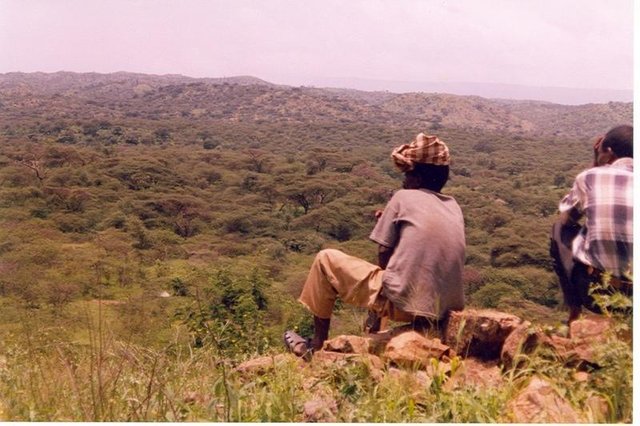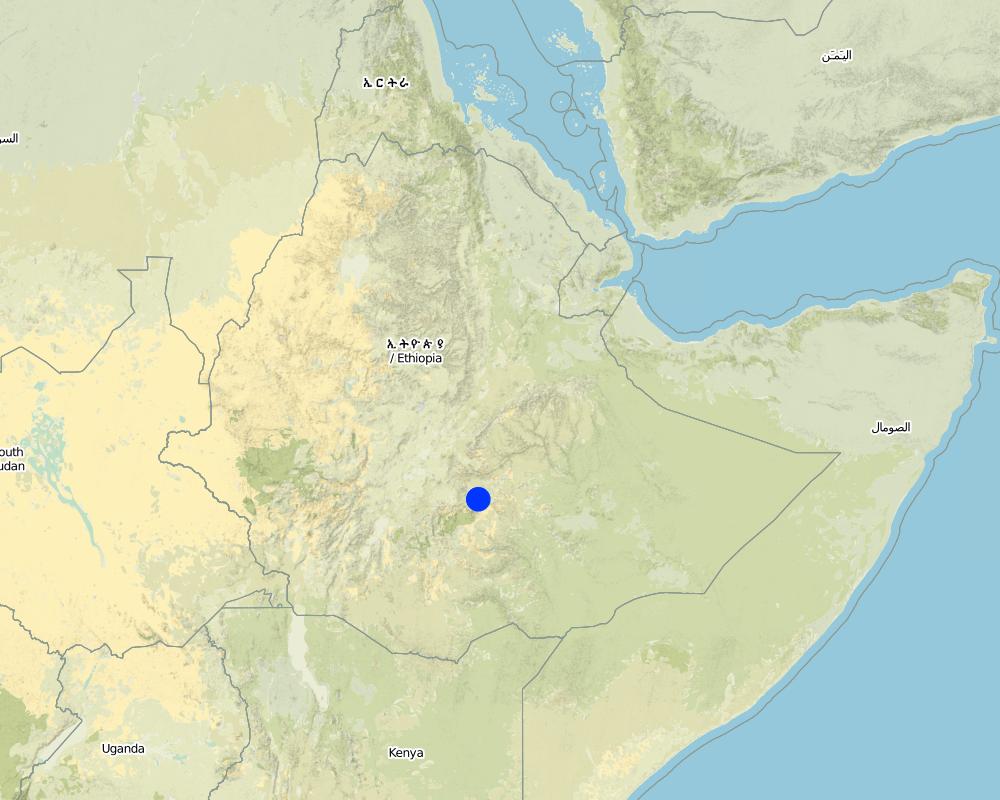Project (LLPPA) [Ethiopia]
- Creation:
- Update:
- Compiler: Philippe Zahner
- Editor: –
- Reviewer: Fabian Ottiger
approaches_2380 - Ethiopia
View sections
Expand all Collapse all1. معلومات عامة
1.2 Contact details of resource persons and institutions involved in the assessment and documentation of the Approach
Name of the institution(s) which facilitated the documentation/ evaluation of the Approach (if relevant)
Swiss Agency for Development and Cooperation (DEZA / COSUDE / DDC / SDC) - Switzerland1.3 Conditions regarding the use of data documented through WOCAT
The compiler and key resource person(s) accept the conditions regarding the use of data documented through WOCAT:
نعم
1.4 Reference(s) to Questionnaire(s) on SLM Technologies

Area closure [Ethiopia]
Closure of degraded land is made on land that has lost vegetation cover, has low soil fertility . To speed up the regeneration process applying some SWC activities and enrichment plantation will be necessary.
- Compiler: Unknown User
2. Description of the SLM Approach
2.1 Short description of the Approach
It is a local level participatory planning approach.
2.2 Detailed description of the Approach
Detailed description of the Approach:
Aims / objectives: This approach is to strengthen and hinance the community participation on SWC based development to bring sustainable development, To improve soil fertility and water infilteration, as the result to improve productivity, By group approach and volentier farmers, 1. Socio economic survey , 2. Teaching the target group and community, 3. Designing the plan, 4. Designing or prepaing action plan, 5. Implimentation of the planned activities, Back round information role, planning role, implimentation role, management role.
2.5 Country/ region/ locations where the Approach has been applied
بلد:
Ethiopia
Region/ State/ Province:
Oromia
Map
×2.7 Type of Approach
- project/ programme based
2.8 Main aims/ objectives of the Approach
The Approach focused on SLM only
2.9 Conditions enabling or hindering implementation of the Technology/ Technologies applied under the Approach
social/ cultural/ religious norms and values
- hindering
Decision from the p.A/ community giving the land to the group.
Treatment through the SLM Approach:
availability/ access to financial resources and services
- hindering
Lack of hand tools they use by ther own.
Treatment through the SLM Approach: for moist of them provided from wareda K.L.A.N.R. of siol.
legal framework (land tenure, land and water use rights)
- enabling
The existing land ownership, land use rights / water rights moderately helped the approach implementation
knowledge about SLM, access to technical support
- hindering
Lack of technology awareness
Treatment through the SLM Approach: Trainning were given by wereda specialist
3. Participation and roles of stakeholders involved
3.1 Stakeholders involved in the Approach and their roles
- local land users/ local communities
Specific ethnic groups: Oromo and Amhara
Labour contribution. Women are mostlly restricted in house. Every group member have right and freedom to make adecision.
- national government (planners, decision-makers)
Technical and material support.
- woreda natural resource expert
If several stakeholders were involved, indicate lead agency:
LLPPA Approach
3.2 Involvement of local land users/ local communities in the different phases of the Approach
| Involvement of local land users/ local communities | Specify who was involved and describe activities | |
|---|---|---|
| initiation/ motivation | interactive | public meetings, workshops/seminars; Produce new idea some problem by disccsion. |
| planning | interactive | |
| implementation | passive | |
| monitoring/ evaluation | passive | interviews/questionnaires, reporting, measurements/observations; |
| Research | none |
3.4 Decision-making on the selection of SLM Technology/ Technologies
Specify who decided on the selection of the Technology/ Technologies to be implemented:
- mainly land users, supported by SLM specialists
Explain:
First wereda expert were inform for community on the import one of natural resource conservation then the community organized in auorteanteary base and difinite area with the specialist.
Decisions on the method of implementing the SLM Technology were made by mainly by SLM specialists with consultation of land users. Expert delimat the area and recommeded pasebel measures and follow the implementation.
4. Technical support, capacity building, and knowledge management
4.1 Capacity building/ training
Was training provided to land users/ other stakeholders?
نعم
Specify who was trained:
- land users
- 1-extensionists/trainers. 2-school children/students
Subjects covered:
About SWC objective the reason to b conserved and it about its benefit.
4.2 Advisory service
Do land users have access to an advisory service?
نعم
Describe/ comments:
Key elements: Motivation, Production; 1) Mainly: government's existing extension system, Partly: projects own extension structure and agent
Advisory service is quite adequate to ensure the continuation of land conservation activities
4.3 Institution strengthening (organizational development)
Have institutions been established or strengthened through the Approach?
- yes, moderately
Specify the level(s) at which institutions have been strengthened or established:
- local
Specify type of support:
- capacity building/ training
- equipment
4.4 Monitoring and evaluation
Is monitoring and evaluation part of the Approach?
نعم
Comments:
technical aspects were regular monitored through measurements
socio-cultural aspects were regular monitored through observations
economic / production aspects were ad hoc monitored through measurements
area treated aspects were None monitored through observations
no. of land users involved aspects were monitored
management of Approach aspects were monitored
There were few changes in the Approach as a result of monitoring and evaluation
5. Financing and external material support
5.1 Annual budget for the SLM component of the Approach
If precise annual budget is not known, indicate range:
- < 2,000
Comments (e.g. main sources of funding/ major donors):
Approach costs were met by the following donors: government (national): 25.0%; national non-government (-): 50.0%; local community / land user(s) (-): 25.0%
5.2 Financial/ material support provided to land users
Did land users receive financial/ material support for implementing the Technology/ Technologies?
نعم
5.3 Subsidies for specific inputs (including labour)
- equipment
| Specify which inputs were subsidised | To which extent | Specify subsidies |
|---|---|---|
| tools | Handtools | |
- agricultural
| Specify which inputs were subsidised | To which extent | Specify subsidies |
|---|---|---|
| seeds | fully financed | |
| Seedlings | fully financed | |
If labour by land users was a substantial input, was it:
- food-for-work
Comments:
Within voluntary labout input seedling planting & repitting, Within food for work sonstruction of terriace.
6. Impact analysis and concluding statements
6.1 Impacts of the Approach
Did the Approach help land users to implement and maintain SLM Technologies?
- No
- Yes, little
- Yes, moderately
- Yes, greatly
Arround more than 1000 the srounding households.
Did the Approach improve issues of land tenure/ user rights that hindered implementation of SLM Technologies?
- No
- Yes, little
- Yes, moderately
- Yes, greatly
Did other land users / projects adopt the Approach?
- No
- Yes, little
- Yes, moderately
- Yes, greatly
6.3 Sustainability of Approach activities
Can the land users sustain what has been implemented through the Approach (without external support)?
- yes
6.4 Strengths/ advantages of the Approach
| Strengths/ advantages/ opportunities in the land user’s view |
|---|
| About its increasing of grass production (How to sustain/ enhance this strength: Through protection from any interfirance) |
| Satisfuction of their fuel wood demand (How to sustain/ enhance this strength: Through protection from any interfirance) |
| Strengths/ advantages/ opportunities in the compiler’s or other key resource person’s view |
|---|
| Reducing run-off and inc infiltration (How to sustain/ enhance this strength: contineous mentenance of physical and biological structure.) |
| Moisture harvesting (How to sustain/ enhance this strength: contineous mentenance of physical and biological structure.) |
| Increasing income generation (How to sustain/ enhance this strength: Contineous protection from animal interfirance with proper utilzation by cut and carry system.) |
| It is solving shortage of fuel and construction wood (How to sustain/ enhance this strength: Throught contineous replantation and protection from misusing interfirance) |
7. References and links
7.1 Methods/ sources of information
- field visits, field surveys
- interviews with land users
Links and modules
Expand all Collapse allLinks

Area closure [Ethiopia]
Closure of degraded land is made on land that has lost vegetation cover, has low soil fertility . To speed up the regeneration process applying some SWC activities and enrichment plantation will be necessary.
- Compiler: Unknown User
Modules
No modules


